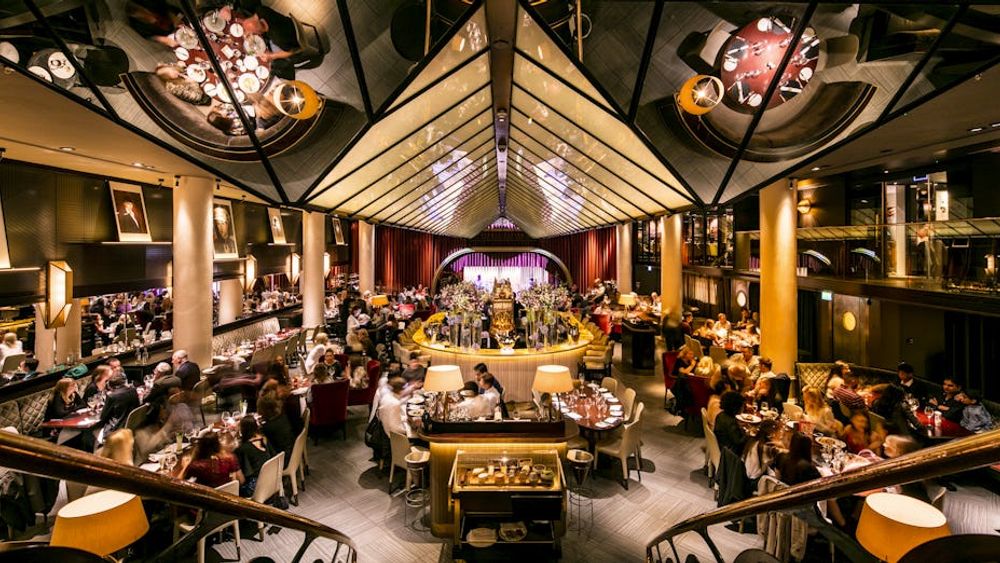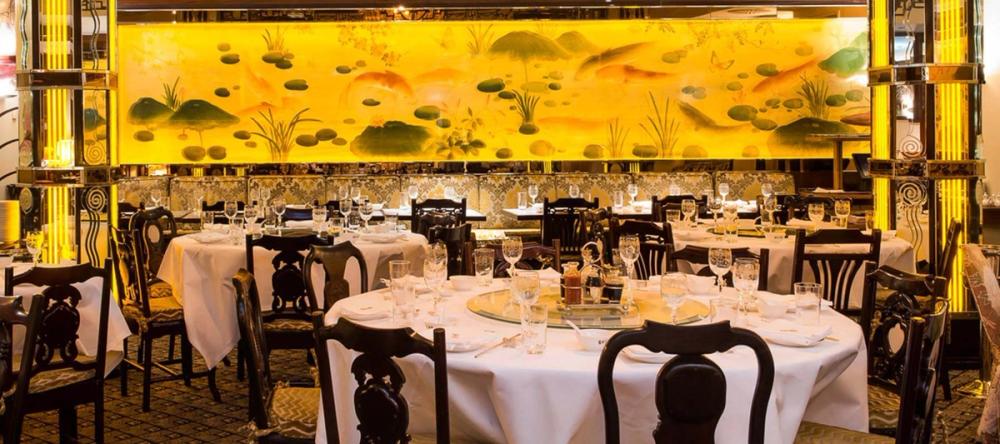The UK and London restaurant scene has been blessed with some huge personalities and legendary figures over the years. But they would be quick to appreciate they could not have become such great respected restaurateurs if it was not for the super talented general managers, and food and beverage directors that, quietly, make sure all the strings are pulled in the right direction behind them.
For they are not the ones who are in the restaurant every day. They are not even the ones that a restaurant’s most regular and important customers have any sort of relationship with. For that, they rely on the personalities and skills of their general manager and front of house teams.
It’s a role that Peter Horton admits he did not know really existed when he first set out doing a hotel management course in the late 1980s and working in bars in the 1990s.
But it is a position he has written his own rule book for such has been his presence and influence on the hospitality and premium London restaurant scene over the last 30 years or so.
His CV is a roll call of some of the most legendary names in UK hospitality, including being part of Sir Terence Conran’s team, as beverage manager, that helped turn Quaglino’s into the most famous coveted restaurant in London in the early 1990s.
His wide and varied career has also included the St James’s Club, Maison Novelli, and the role he is probably most well known for as director and general manager at Sir David Tang’s premium Chinese restaurant, China Tang, at the Dorchester Hotel.
He also helped set up the go to restaurant of the early 2000s - Smiths of Smithfield, the four floor restaurant concept with chef John Torode.
He was most recently involved in heading up the launch and opening of The Sandeman Quarter, David Gleave and Sogrape’s homage to Port in the City of London with Bar 1790 and The Don restaurant at Sandeman Port’s original home in St Swithins Lane.

Peter Horton was part of the Quaglino's team under Sir Terence Conran
“Quaglino’s was a phenomenon,” he says. “It was 1993, at the height of recession, just after the first Gulf War, and there were queues down the street to get in. We use to lose over 2,000 of the famous Quaglino ashtrays every month.”
He says the restaurant scene today still has a lot to thank those illustrious years in the 1990s for when going out for dinner became one of the most exciting things you could do at breakthrough places such as Kensington Place or 5th Floor Harvey Nichols. The drinking and cocktail scene then took off thanks to the likes of Oliver Peyton’s The Atlantic Bar opening in 1994.
“It was the start of the restaurant revolution,” says Horton. A revolution he was very happy to be front and centre of.“You could have a glamorous night out without having to spend a fortune,” he says of a sector that he has seen grow, evolve and become “professionalised” over the 30 years.
Experience counts
Experiences that arguably put him in a unique position today to determine what it is that makes one restaurant, or bar, succeed over another.A background he hopes he can use to help work with the current generation of restaurateurs and investors on their new major restaurant projects.
“Getting and retaining staff is the biggest challenge we have. We have lost a lot of our traditional skills over recent years. So much of the experience and charm has gone,” he claims.
He admits it might not sound that important but losing the “charm” from a restaurant can be crushing regardless how “slick the operation is”.
“Everyone likes to be remembered. Everyone likes to be asked how they are. You have to be very careful in hospitality if you lose that.”

Peter Horton says being a good restaurant general manager is about getting all the small things right that make such a difference to a customer's visit
Which is why in all the training he does it is about getting the little things right that can mean so much to how well a restaurant performs. Welcome every new guest with a smile and make sure you do everything during their stay that will make them want to come back. That’s the Peter Horton way of running a restaurant.
“The most important part of my job is to get your teams to work well together. Good teams make for good business which is why it is important companies invest in their teams,” he explains.
Which is a lot easier said than done. “I have been very fortunate with the teams I have worked with,” he adds. “I have a lot of time and respect for them. There are a lot of well known places that are impersonal and formulaic.”
It is also very much down to the general manager to give their teams the “energy” they might need at certain times of the week. “That really comes with experience and understanding we are all part of one team and knowing when that team needs that extra bit of help to keep those energy levels up.”
Relationships and customers
The reason private members clubs are doing so well, and becoming so much more popular, is that is where customer service really matters - and is expected.
“That is why the best restaurants feel like walking into a club,” explains Horton pointing to the success that Jeremy King and Chris Corbin have had with the likes of The Ivy, Caprice and The Wolseley over the years. He says he learnt so much himself about the art of customer serviceduring his time working at St James’s Club and the London Capital Club.
“It is that sense of belonging, being known, and the exclusivity of it all.”
Interestingly Horton also says the best restaurant teams also apply the same “charm” and level of service to their suppliers. Building meaningful relationships with them is as important as with your customer, he says. They are not just companies supplying you with food, or wine, or spirits. They are your partners and an extension of your team.
It is an area of hospitality that has improved “10 fold” over the last 15 years, he adds.
“Bibendum and Liberty Wines set the benchmark in how you can work together with your customers. The level of training and support you can offer. The days of the snobby wine merchant who made you feel like they were doing you a favour supplying you any wine have long gone.”

Peter Horton singles out Michael Saunders for the impact he made at Bibendum and David Gleave's role at Liberty Wines in setting the benchmark for other wine importers and suppliers to follow
He adds: “Michael Saunders and David Gleave have done more for the on-trade than probably anyone else when it comes how suppliers now work with restaurants. They understood us. They knew how bloody hard it is to run a restaurant. They listened and asked how can we help you, what do you want us to do to supply you?”
The best wine suppliers are also some of your most loyal customers, says Horton. “It means so much to you when your wine supplier comes to your restaurant to entertain their guests. It is wonderful. It is the greatest compliment they can give.”
What’s more they are usually bringing other “industry” people to your restaurant who are more likely to come back with their customers one day.
Because that “benchmark” is now so high any wine or drinks supplier that does not live up to it is soon found out, he stresses. “They have got to understand how the restaurant works and what sort of operation it is. They need to come in and say ‘Hello, Peter, how can we help you’. Don’t come in dictating terms. We sometimes still get that from drinks suppliers. You rarely do with our wine suppliers.”
Investing in training
Horton says any quality restaurant knows it pays to invest not only in a great wine list, but a team of sommeliers and trained staff to help sell it. By great he does not mean listing every fine wine known to humanity, but wines that are finely selected to the meet the wallets and spending power of their average customers, with enough pizzazz to keep it fresh, exciting and interesting for those looking to spend a little more.

Peter Horton says he particularly enjoyed the impact he was able to make at China Tang
He looks back on his time at China Tang where 51% of the restaurant’s revenue came from its award-winning food which took 30 chefs to produce and 15 waiters to serve. Yet its wine and spirits brought in 49% of its turnover and had a five-strong bar team and four sommeliers.
Which is why he does not understand how a restaurant general manager can’t be interested in wine and spirits. “It’s equally as important as your food.”
Even if a restaurant does have a sommelier it is important for all the waiters to have some wine knowledge and to be able to recommend wines on the list in their own words, claims Horton.
Being excited about wine has never been a problem for Horton. “I am genuinely passionate about wine and have always tried to instil that passion in my teams.”
He is also quick to stress how important his initial training in food and beverage and hotel management has been throughout his hospitality career. Time and again, over the years, he has gone back to the business and commercial skills he learnt at college.
“It taught me those financial disciplines that have been so important in my career,” he says.
It also helped make him realise during his early years as a beverage manager that he wanted to evolve and take on more responsibility for managing the overall restaurant and operation.
After all being the general manager puts you in the heart of the action and you don’t get much more centre stage than at China Tang in the Dorchester on Park Lane. Horton admits his seven years working there, up to 2018, was probably where he was happiest in his career.
It also meant working hand in hand with the larger than life Sir David Tang with whom Horton says he had a strong working relationship. A time together that also gave Horton a bank of wonderful stories that only he can do justice.
Project managing
A time that has also puts him in a great position to share his experiences and knowledge with potential new restaurant ventures.
“Ideally I like to be involved at the beginning so that I can be there from the start, working with contractors, helping to design the layout of the restaurant, working out where the bar should be and managing the flow of customers through the restaurant down to where the ice is, the till, the bins,” he explains.“You have to get all that right from the start.”
He adds: “You also have to manage people’s expectations and tell them that any project will not be finished on time.”
As well as training new restaurant teams, Horton is also happy to help recruit them as well and make sure they are bringing in the right quality and calibre of staff for that particular venue.
Then there is managing and bringing in the right suppliers that Horton personally knows and has built strong trading relationships with.
Horton is also keen to "go into existing places and help troubleshoot or assist in repositioning them" with all the years of experience he brings.
As he says: “I have been very lucky to have enjoyed such a wonderful career and met and worked with so many great people. We really do work in a wonderful industry and are all so lucky to be part of it.”
* If you are interested in contacting Peter Horton you can email him at hoddyp@hotmail.co.uk.
































